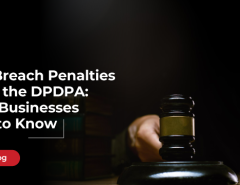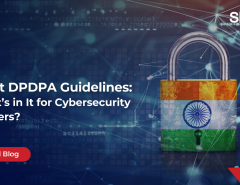India’s swift enactment of the Digital Personal Data Protection (DPDP) Act has triggered considerable apprehension among businesses, mainly due to the impending deadline for compliance. Several myths regarding the Act have further intensified the confusion. To educate the business community on various nitty-gritty of the Act, SEQRITE and ET CISO recently organized a webinar, “Navigating the Digital Personal Data Protection Act – Opportunities, Challenges, and Solutions,” where SEQRITE’s Senior Director – Product Management, Mr. Vinaya Sathyanarayana shared his insightful take on the subject. This article chronicles the highlights of the webinar. Read on…
The Genesis of the DPDP Act
The origin of the DPDP Act predates 2017, gaining momentum when the Supreme Court declared the right to privacy a fundamental right in August of that year. Subsequently, the Personal Data Protection Bill was introduced in December 2019. Despite facing various iterations and a surprising withdrawal by the government in August 2022, a revised version swiftly made its way through both houses of parliament, officially becoming an act on August 11th, 2023.
Key Concepts and Entities within the DPDP Act
Post the act’s passage, attention shifted to the imminent constitution of the Data Protection Board of India, which was expected to provide detailed guidelines and timelines for compliance. SEQRITE, in its efforts to assist businesses in navigating this regulatory landscape, emphasizes the critical need to understand key definitions, entities, and challenges within the act.
One fundamental concept introduced by the act is that of a Data Principal—an individual to whom personal data relates. Personal data, as defined by the act, encompasses information that can directly or indirectly identify an individual. While the act currently lacks specific categories like sensitive or critical personal data, SEQRITE anticipates their introduction in the coming months.
The role of a Data Fiduciary (individuals or enterprises determining the purpose and means of processing personal data) is central to the act. Significantly, this responsibility extends throughout the supply chain, underscoring the need for compliance at all levels.
Other stakeholders and roles outlined in the act include data processors, consent managers, and the Data Protection Board. The imminent establishment of the Data Protection Board is anticipated to provide comprehensive guidelines.
Operations and Challenges in Processing Personal Data
The act involves various operations in processing personal data, including collection, storage, retrieval, use, sharing, and disclosure. Enterprises, accustomed to business as usual without privacy regulations, now face the challenge of identifying data points within their ecosystem, especially considering that even employee data falls under the act’s purview.
A significant challenge arises with the rights granted to data principals, who are empowered with access, correction, erasure, grievance filing, and nomination rights. Automated subject rights requests, common under GDPR and CCPA, pose a substantial challenge for businesses.
Consent Management and Compliance Measures
Consent management emerges as a pivotal touchpoint, requiring businesses to obtain explicit and informed consent from data principals for every data type collected. Security measures, tools, systems, and data privacy impact assessments become imperative for compliance.
The Solution
It is safe to conclude that the DPDP Act introduces a new paradigm to businesses irrespective of whether they are already compliant with global privacy regulations or are just beginning their compliance journey. It necessitates a comprehensive understanding of roles, responsibilities, and compliance measures. SEQRITE aims to assist businesses on this journey, offering a robust Data Privacy Management Solution to kickstart their privacy compliance initiatives.
SEQRITE’s Data Privacy Management Platform is designed to automate the discovery and classification of personal data, addressing the challenges posed by the DPDP Act. Our solution offers enhanced data cognition, subject rights request management, and intuitive compliance support, ensuring a comprehensive understanding of an organization’s data posture. The solution prioritizes data security through role-based access control, integrates seamlessly with other SEQRITE products via our Centralized Security Management platform, and extends privacy concepts across endpoints.
In the digital privacy landscape, a Data Privacy Management Solution like SEQRITE’s is pivotal in aiding compliance, safeguarding reputation and customer trust, and ensuring business continuity. This advanced solution is an indispensable tool for businesses and government entities striving for excellence in data privacy management.




